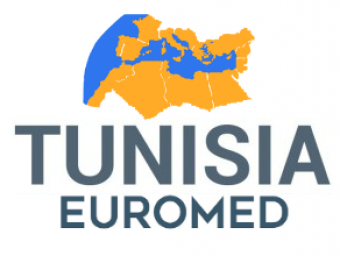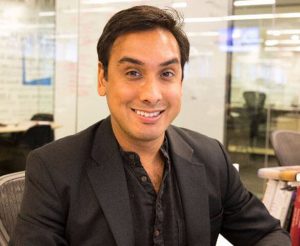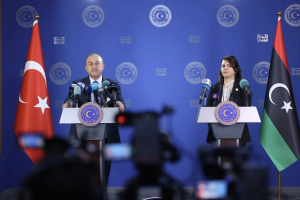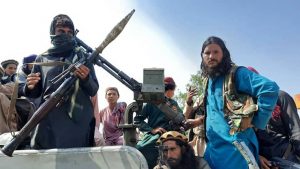fighting between forces loyal to rival Libyan governments rages on in Tripoli’s outskirts, the capital’s residents fear they are facing the grim prospect of a long, bloody war.
“Life goes on, and it’s surprisingly normal in the capital,” said Salim, 35, messaging from a downtown restaurant.
Just a week ago he was forced to flee his home on Tripoli’s Airport Road, after it was shelled in fighting between the Libyan National Army (LNA), led by Field Marshal Khalifa Haftar and Libya’s eastern-based government and forces of the UN-backed Tripoli-based Government of National Accord (GNA).
The World Health Organisation (WHO) said on Thursday that 205, including 18 civilians, had been killed in the two weeks of fighting outside Tripoli with more than 16,000 having already fleeing the capital.
Now living with extended family members in downtown Tripoli, Salim is making plans to try and leave Libya. But his family is large and getting everyone out and paying for rented accommodation in, for example Tunisia, is an expensive option, and one that is beyond the finances of most ordinary civilians.
‘I’m just so tired of living like this, always in a very difficult situation and being afraid of war’
– Salim, Tripoli resident
“I don’t know what’s going to happen but I expect it’s going to be a big and long war, which is why I‘m seriously considering leaving Libya,” Salim said.
“I’m just so tired of living like this, always in a very difficult situation and being afraid of war.”
Normality has long been a very flexible term in Libya. Even in the capital, for years regular intra-militia clashes have been coupled with acute shortages of cash and electricity, and expensive basic living costs.
It is not only civilians who are adapting to current threats. Tripoli’s Mitiga airport has reopened after being bombed by the LNA, in an attack that hit a military plane on the runway, according to an airport source.
But flights are currently only operating at night, when LNA warplanes are unable to carry out further airstrikes.
“Maybe it’s because their aircraft and pilots are old but the LNA don’t seem able to bomb at night, so that’s when we’re running our civilian flights,” the airport source told MEE. GNA forces shot down a LNA warplane in southern Tripoli on Sunday.
Scared of further air strikes on Mitiga, many civilians are opting to travel between the capital and neighbouring Tunisia by road, on a route currently unaffected by the conflict.
LNA forces are, at present, quite far from downtown Tripoli, approximately 20-25 km at their nearest position. But the impact of fighting is creeping closer to more populated neighbourhoods. On Monday, five shells fired by unknown forces fell on Tripoli’s populated Abu Salim district, injuring one civilian, according to Libya Alahrar TV.
“The fighting is mainly in Wadi al-Rabea, Tripoli’s Ain Zara and Qasar Ben Gasheer suburbs and the Airport Road,” explained another resident, Mohamed. He said the most intense recent fighting was in Wadi al-Rabea and Ain Zara.
A video grab published on the Libyan National Army War Information Division’s Facebook page on 16 April 2019 (AFP)
A video grab published on the Libyan National Army War Information Division’s Facebook page on 16 April 2019 (AFP)
“The LNA is focusing on south and south-eastern areas of Tripoli, with many fighters coming from the Tarhouna area. It looks like Haftar is planing to try and cut the road between Tripoli and Misrata, which is a vital supply link for weapons and fighters,” he said.
LNA sources told the Arab Weekly this was a strategy to draw GNA forces into non-residential areas, to avoid a protracted, destructive war inside the capital.
However, Mohamed predicted that, with Misrata reportedly already having sent hundreds of troops to Tripoli’s front-lines, fighting in the suburbs was already turning into a major battle.
The threat of war remains terrifyingly close even in areas of the capital as yet largely unaffected. In the Souq al-Juma district of Tripoli, 27 year-old Khalifa told MEE: “It’s a big war happening in Tripoli’s south-eastern suburbs. We are safe for now because the fighting is still quite far from us but we can sometimes hear the explosions.”
At the opposite end of the city, a resident in the western Tripoli suburb of Janzour, Ahmed, said his area was quiet, although distant fighting could be heard.
Anticipating the worst, he already has his bags packed and his car filled with petrol, ready to evacuate his family.
Memories of 2014
The early stages of the battle for Tripoli are rekindling harsh memories of the capital’s last major war almost five years ago, prompted by the results of Libya’s last parliamentary elections.
Disenchanted with “independent” candidates in previous elections who had later revealed clear allegiances to more radical Islamist factions, in 2014 a low turnout of 18 percent voted for more moderate representation. The result was catastrophic.
As militias loyal to rival sides clashed in Tripoli, the elected government and parliament were chased out of the capital, since when they have been based in eastern Libya.
In a month-long battle, warring militias destroyed Tripoli International Airport and numerous aircraft, set civilian oil infrastructure ablaze and prompted most international embassies, companies and organisations to flee to neighbouring Tunisia.
“It’s like 2014 all over again but, this time, we expect the war will be worse, much worse,” said Khalifa. “Last time they didn’t use warplanes.” Reliance on airpower has left large areas of Benghazi and Sirte in ruins and residents are terrified the same fate could befall Tripoli.
‘It’s like 2014 all over again but, this time, we expect the war will be worse, much worse. Last time they didn’t use warplanes’
– Khalifa, Tripoli resident
With a chilling nod to Tripoli’s 2014 war – which forced the elected government and parliament to flee to eastern libya and left vital infrastructure in ruins – international organisations, which had only started returning to the capital in recent years have already pulled out most expatriate staff. According to a Libyan UN employee, all non-essential foreign UN staff have been evacuated to Tunisia.
American nationals, along with some US military personnel, were evacuated via a US warship from Palm City, a gated coastal enclave popular with expatriates.
The Tripoli fighting is likely to further put back Western embassies’ plans to fully reopen operations in Libya, which have largely ceased since 2014. A British embassy official told MEE three years ago that several years of continuous, uninterrupted peace in the capital were a pre-requisite for the British embassy to become fully-operational again.
Misrata militias return to Tripoli
Another consequence of recent fighting which has filled residents with dread is the redeployment of militias from Libya’s third city of Misrata to Tripoli.
Misrata’s battle-hardened militias are widely-viewed as one of western Libya’s more effective fighting forces but their former presence in Tripoli was controversial.
In November 2013, Misratan fighters opened fire on peaceful anti-militia protestors, killing 47 civilians and injuring over 460. Misrata militias also participated in the 2014 Tripoli war.
Even five years later, people still talk about widely-circulated footage of the leader of Misrata’s al-Marsaa Brigade Salah Badi standing in front of a burning Tripoli International Airport, praising Allah for its successful capture, and footage of his fighters walking around on the wings of brand new Airbus riddled with bullet-holes.
‘I really think this war is going to last for fucking ages’
– Ferhad, businessman
Misrata’s subsequent involvement with the installation of Tripoli’s self-proclaimed National Salvation Government (2014- 2016) after the elected government had fled to eastern Libya, was also controversial. In an interview with MEE last year, a Misratan government official, speaking privately, admitted: “Misrata has made a lot of mistakes since 2011 and, to be honest, a lot of people hate us because of this.”
Misrata forces have clashed with the LNA on a number of battlefronts across Libya in the last four years, most of which they eventually conceded through negotiated peace settlements. The military arm of Misrata has long viewed Haftar and his forces as its greatest enemy in Libya.
Even during the battle against the Islamic State (IS) group in Sirte in 2016, during interviews, many Misratan commanders leading the offensive often wanted to talk more about Haftar, who they routinely termed a “war criminal”, than they did about their own advances against IS.
“This war is already a total disaster. Misrata militias are back in Tripoli and, even if Haftar loses the war, what incentive will there be for Misrata militias to ever leave?” said furious Tripoli businessman Ferhad, who complained that businesses across the capital were already suffering a huge downtown in sales.
“And if Haftar wins, it will also be a disaster for us. There are a lot of weapons involved but I don’t think either side has enough power to actually win this battle, so I think they’ll fight until they suffer great losses and Tripoli is badly damaged, and then they will reach some kind of agreement. I really think this war is going to last for fucking ages.”
Years of negotiations, led mainly by the UN and the international community, towards a peaceful settlement to Libya’s troubled political and military situation post-2011 have repeatedly failed.
The early phases of the battle for Tripoli have left most Libyans giving up hoping for a peaceful solution, and believing any outcome looks set to bring with it further conflict.
“It’s unlikely that Haftar will withdraw from this battle because it would lead to the partition of Libya and further civil wars. If he does withdraw, the GNA’s forces will go to all the pro-LNA towns, especially Tarhuna which is now almost 100 percent with Haftar, and demand they hand over their weapons, which they will obviously refuse to do, and that will spark more fighting,” said Mohamed.
“The most likely scenario is that the LNA will persevere and eventually take Tripoli, but that will not be easy and I think could take at least six months.”
Support for LNA inside Tripoli
How much popular support the LNA actually commands in the capital remains to be seen, but there are solid pockets of LNA loyalists. Under two faltering Tripoli-based governments, among long-term supporters of the eastern-based government, the whispered phrase “Haftar is coming” was heard for years.
Supporters believed that, with his outspoken antagonism towards hardlined Islamist ideologies and militias, Haftar could bring peace and normality to the capital, returning Libya’s only elected governing bodies to their rightful Tripoli institutions.
With the long war in Benghazi and then Derna, a hotbed of extremism even under Gaddafi, as well as other civil conflicts that have repeatedly flared up, the LNA’s arrival to Tripoli’s outskirts has taken almost five years.
Libyan demonstrators hold signs against what they call foreign intervention in Libya, during a protest outside the municipality of Tripoli, on April 16, 2019 (AFP)
Libyan demonstrators hold signs against what they call foreign intervention in Libya, during a protest outside the municipality of Tripoli, on 16 April 2019 (AFP)
Despite this, residents say Haftar and the LNA still have a solid support base, notably in Tripoli’s eastern suburb of Tajoura and the downtown area of Fashloom, where pro-LNA uprisings were mercilessly crushed in 2015.
“These areas are still waiting for Haftar and they are not the only ones,” said Mohamed.
“A group of civilians in [the west-central Tripoli area of] Gergarish recently announced their support for Haftar but their meeting was broken up by armed militiamen, and there are many other supporters who are afraid to publicly voice their opinions.”
If Haftar can achieve victory in Tripoli, indications from the ground suggest he might receive a wider welcome than vehemently anti-Haftar camps and perhaps the international community, would like to believe.
But, at present, that prospect remains a long way off.




![Who benefited from the Libya conference in Berlin? - Cartoon [Sabaaneh/MiddleEastMonitor]](https://i0.wp.com/www.middleeastmonitor.com/wp-content/uploads/2020/01/IMG_0150-2.jpg?resize=933%2C583&quality=85&strip=all&zoom=1&ssl=1)



